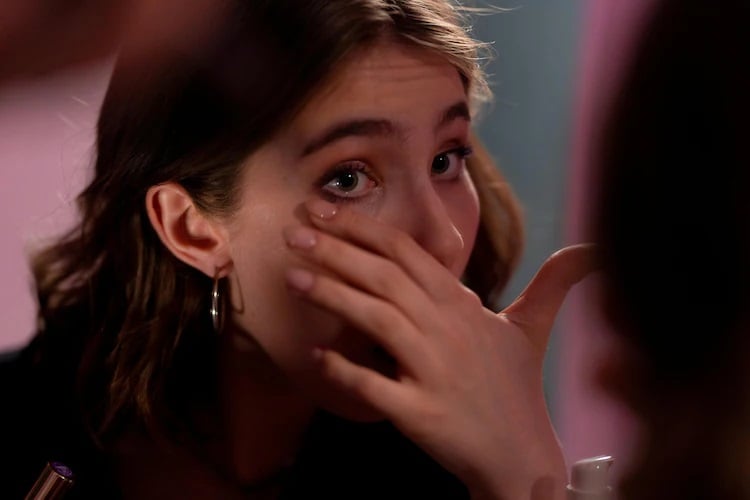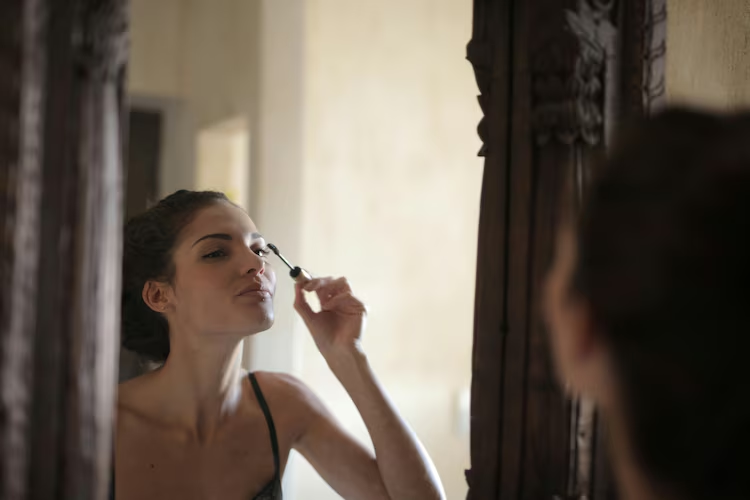
Although the scalp is frequently linked to dandruff, it may also show up on the nose, eyebrows, and mustache! But did you realize that there is such a thing as eyelash dandruff? In contrast to other parts of the body, eyelash dandruff is hardly noticeable to the unaided eye, yet if ignored, it may be quite dangerous. In order to prevent infections, lens users should pay particular attention to eyelash dandruff.
Blepharitis, sometimes known as "eyelash dandruff," is a common eye ailment that causes crusty deposits on your lashes that resemble dandruffflakes. According to Dr. SN Jha, chairwoman of ophthalmology at Sir ganga Ram Hospital, this occurs when there is an excessive amount of germs on your eyelids at the base of your eyelashes or when your oil glands get inflamed and blocked.

It is really frequent and is brought on by either fungal growth or excessive oil production. This problem can also be caused by conditions like seborrheic dermatitis or a mite infestation (demodex)," says Dr. Digvijay Singh, senior consultant and head of ophthalmology at Narayana Hospital in Gurugram.
According to experts, it frequently occurs throughout the winter or when the seasons change.
Just so you know, wearing mascara and eyeliner to bed may also cause dandruff on your lashes.
 The symptoms of eyelash dandruff include crumbly flakes at the base of the lashes, itchy, red, or swollen eyelids, and a burning or gritty feeling in the eyes, even if it may not be easily noticeable.
The symptoms of eyelash dandruff include crumbly flakes at the base of the lashes, itchy, red, or swollen eyelids, and a burning or gritty feeling in the eyes, even if it may not be easily noticeable.• Flaky skin or oily secretions along the edge of the eyelid
• Crusty eyelashes
• Eyelids stuck together in the morning
• Itching or burning sensation
• Red, swollen eyelids
• Watery eyes
• Sensitivity to light
Why Eyelash Dandruff Is Very Risky?
Dandruff on your eyelashes can seriously endanger the health of your eyes and is not only a cosmetic concern.
"There is a risk of chronic irritation and redness of the eyes, eyelash loss, dryness of the eyes, corneal damage, and a predisposition to inflammatory conditions such as styes and chalazion," explains Dr. Jha.
 Eyelash dandruff can raise the chance of developing chronic eye infections including conjunctivitis or keratitis (inflammation of the cornea) if treatment is not received. Dr. Singh cautions that excessive eye rubbing brought on by irritation can weaken the corneas even more and increase the risk of developing diseases like keratoconus, which is characterized by a thinned and cone-shaped cornea.
Eyelash dandruff can raise the chance of developing chronic eye infections including conjunctivitis or keratitis (inflammation of the cornea) if treatment is not received. Dr. Singh cautions that excessive eye rubbing brought on by irritation can weaken the corneas even more and increase the risk of developing diseases like keratoconus, which is characterized by a thinned and cone-shaped cornea.Those who wear lenses should take special care to keep their eyes clean.
Preventing and managing eyelash dandruff
The most crucial step in avoiding and treating blepharitis is maintaining good eyelid cleanliness.
Here are a few things you can do to keep it at bay:
• Regularly clean eyelashes with a gentle cleanser
• Avoid using expired makeup products
• Remove eye makeup before sleeping
• Scalp dandruff can predispose to eyelash dandruff (so, treat scalp dandruff first)
• Avoid sharing makeup applicators
See an eye doctor if you see eyelash dandruff or observe any of its signs. Depending on how serious the condition is, the specialist may recommend moisturizers, medications (eye drops), or even steroids.
"We also use lid scrubs and lid wipes that contain tea tree oil to treat this effectively," Dr. Arora explains.
But what about eyebrow dandruff?
Your eyes may also be at risk from eyebrow dandruff, which is frequently an extension of scalp or hair dandruff. Even while it might make you feel embarrassed, it's more than just a cosmetic problem.
According to Dr. Jha, "brown dandruff can be caused by psoriasis, dry skin, contact dermatitis (allergic reaction), or dandruff of the scalp (seborrheic dermatitis)."
Flakes of brow dandruff may fall into the eyes, resulting in infections, redness, and discomfort. According to experts, dandruff and eyelid inflammation together can exacerbate symptoms of dry eyes or lead to blepharitis (eyelash dandruff).
It may be avoided in part by keeping the eyebrows clean and taking care of dandruff before it worsens.
Here are some expert-approved tips to prevent and manage eyebrow dandruff:
• Treat scalp dandruff if present with medicated shampoo
• Avoid washing your face, brows, and scalp too much, and stick to a gentle cleanser
• Use moisturisers and anti-itch creams with natural ingredients like tea tree oil and aloe vera
• Avoid products and ingredients that can cause skin irritation
• Avoid picking around the area of your eyebrows
• Cold compresses can reduce irritation and itching




 click and follow Indiaherald WhatsApp channel
click and follow Indiaherald WhatsApp channel